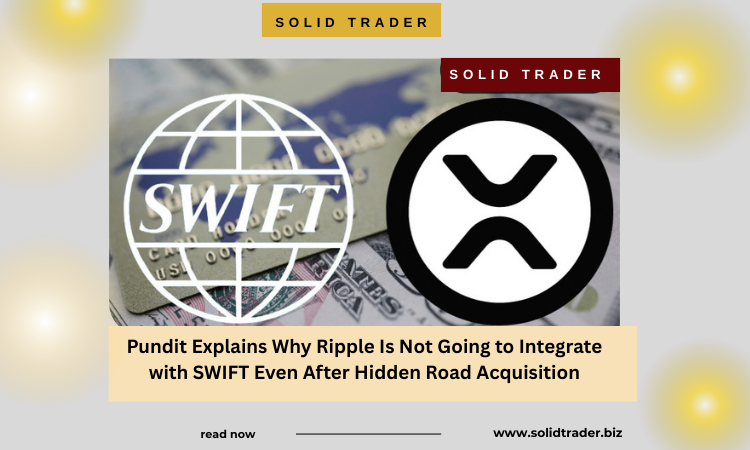Why Ripple Won’t Integrate with SWIFT After the Hidden Road Acquisition. In the ever-evolving landscape of financial technology, Ripple has emerged as a prominent player, pushing the boundaries of cross-border payment solutions. With its recent acquisition of Hidden Road, many observers have speculated whether this move could lead to a partnership with SWIFT, the long-standing network for international money transfers. However, financial pundits suggest otherwise. Here’s an exploration of why Ripple is unlikely to integrate with SWIFT, even after this significant acquisition.
Understanding Ripple and SWIFT
Ripple is known for its blockchain-based payment protocol, designed to facilitate fast and inexpensive cross-border transactions. Its digital currency, XRP, often accompanies these transactions, providing liquidity for various currencies without the need for pre-funding accounts.
Conversely, SWIFT (Society for Worldwide Interbank Financial Telecommunication) serves as a messaging network that enables banks and financial institutions to send and receive information about financial transactions safely and efficiently. While SWIFT has been a reliable system for decades, it has faced criticisms regarding its speed and cost-effectiveness, paving the way for innovative solutions like Ripple.
The Hidden Road Acquisition
Hidden Road, a technology firm specializing in enhancing financial infrastructure, focuses on creating seamless connectivity in the financial services industry. The acquisition allows Ripple to broaden its service offerings, tapping into Hidden Road’s advanced capabilities. However, experts argue that this partnership won’t necessarily lead to an integration with SWIFT.
Reasons Against Integration
1. Different Philosophies
The fundamental philosophies driving Ripple and SWIFT are markedly different. Ripple advocates for decentralization, aiming to eliminate intermediaries in the transaction process. In contrast, SWIFT operates within a traditional framework that involves several intermediaries, relying on established relationships among banks. This philosophical divergence makes integration challenging.
2. Direct Competition
Given Ripple’s mission to disrupt traditional banking systems, an integration with SWIFT might dilute its innovative edge. Ripple seeks to offer a viable alternative to existing systems rather than merely enhancing them. By intertwining with a legacy system, it undermines its value proposition and potentially alienates its existing user base.
3. Regulatory Challenges
The financial sector is heavily regulated, and any integration would face significant scrutiny from regulators worldwide. Ripple itself has been involved in legal battles with the SEC concerning the status of XRP. Further entanglement with SWIFT could complicate Ripple’s ongoing legal challenges and lead to additional regulatory complications.
4. Technological Alignment
The technical architecture of Ripple and SWIFT differs substantially. SWIFT relies on a messaging framework, whereas Ripple uses blockchain technology to facilitate direct transfers between parties. Bridging these systems would require substantial investment in new technology, potentially steering focus away from Ripple’s core mission.
5. Market Dynamics
The current market dynamics favor innovative payment solutions that are agile and adaptable. By maintaining independence from SWIFT, Ripple can rapidly evolve its offerings and respond to market demands without being tethered to a traditional system. This flexibility positions Ripple to be more competitive in the fast-paced fintech landscape.

While the acquisition of Hidden Road signifies a strategic move for Ripple in enhancing its capabilities, it is unlikely to pave the way for an integration with SWIFT. The philosophical differences, direct competition, regulatory hurdles, technological challenges, and the need for market agility collectively contribute to this stance. Ripple remains committed to its vision of revolutionizing the cross-border payment system and will likely continue to pursue this route independently. As the financial landscape progresses, it will be interesting to monitor how Ripple and other fintech entities shape the future of global transactions.
